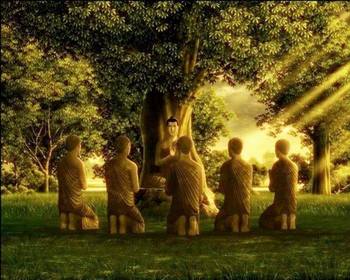A Brief Summary of the Teachings [history]
[THE FOUR NOBLE TRUTHS]

At this rate, one's may have a question in mind, "what is the teachings of Buddhism today based upon?"
According to the legend, as soon as the awakening, the Buddha conveyed his first sermon: the essential framework that influenced later teachings were based. This framework consists the Four Noble Truths, which is four fundamental principles of nature or what we call today, Dhamma.
1. Dukkha: suffering, unsatisfactoriness, discontent, stress.
2. The cause of dukkha: the cause of this dissatisfaction is craving or tanha for sensuality, for states of becoming, and states of not becoming.
3. The cessation of dukkha: the relinquishment of that craving.
4. The path of practice leading to the cessation of dukkha: the Noble Eightfold Path of right view, right resolve, right speech, right action, right livelihood, right effort, right mindfulness, and right concentration.
Because of our ignorance or avijja of these Noble Truths, because of our inexperience in framing the world in their terms, we remain bound to samsara, the wearisome cycle of birth, ageing, illness, death, and rebirth.
"Craving propels this process onward, from one moment to the next and over the course of countless lifetimes, in accordance with karma, the universal law of cause and effect. According to this law, every action that an individual performs in the present moment (by body, by speech, or by mind) bears fruit according to its skilfulness: act in unskillful and harmful ways and unhappiness is bound to follow; act skilfully and happiness will ultimately ensue. As long as one remains ignorant of this principle, one is doomed to an aimless existence: happy one moment, in despair the next; enjoying one lifetime in heaven, the next in hell."
Let's make it simple. We can interpret as Buddhism is based upon our own actions: what you say to others will what you become; what you think is what you become. For example, if you criticise others harshly or not harshly, you may become that "others" you have criticised. On the other hand, if you do good to others, the good you did to others may come back to you. You may not realise it today. Let's contemplate your actions.
@Thai_Buddhism
FaceBook: https://www.facebook.com/ThBuddhism
Twitter: @Thai_Buddhism
スポンサーリンク

At this rate, one's may have a question in mind, "what is the teachings of Buddhism today based upon?"
According to the legend, as soon as the awakening, the Buddha conveyed his first sermon: the essential framework that influenced later teachings were based. This framework consists the Four Noble Truths, which is four fundamental principles of nature or what we call today, Dhamma.
1. Dukkha: suffering, unsatisfactoriness, discontent, stress.
2. The cause of dukkha: the cause of this dissatisfaction is craving or tanha for sensuality, for states of becoming, and states of not becoming.
3. The cessation of dukkha: the relinquishment of that craving.
4. The path of practice leading to the cessation of dukkha: the Noble Eightfold Path of right view, right resolve, right speech, right action, right livelihood, right effort, right mindfulness, and right concentration.
Because of our ignorance or avijja of these Noble Truths, because of our inexperience in framing the world in their terms, we remain bound to samsara, the wearisome cycle of birth, ageing, illness, death, and rebirth.
"Craving propels this process onward, from one moment to the next and over the course of countless lifetimes, in accordance with karma, the universal law of cause and effect. According to this law, every action that an individual performs in the present moment (by body, by speech, or by mind) bears fruit according to its skilfulness: act in unskillful and harmful ways and unhappiness is bound to follow; act skilfully and happiness will ultimately ensue. As long as one remains ignorant of this principle, one is doomed to an aimless existence: happy one moment, in despair the next; enjoying one lifetime in heaven, the next in hell."
Let's make it simple. We can interpret as Buddhism is based upon our own actions: what you say to others will what you become; what you think is what you become. For example, if you criticise others harshly or not harshly, you may become that "others" you have criticised. On the other hand, if you do good to others, the good you did to others may come back to you. You may not realise it today. Let's contemplate your actions.
@Thai_Buddhism
FaceBook: https://www.facebook.com/ThBuddhism
Twitter: @Thai_Buddhism
スポンサーリンク



コメント 0